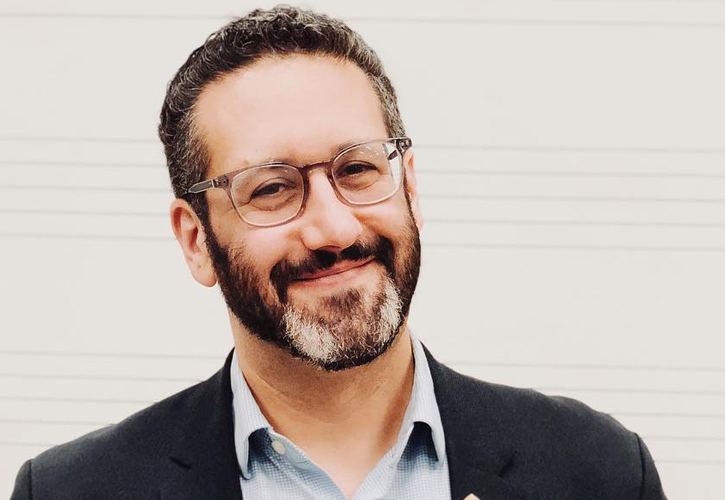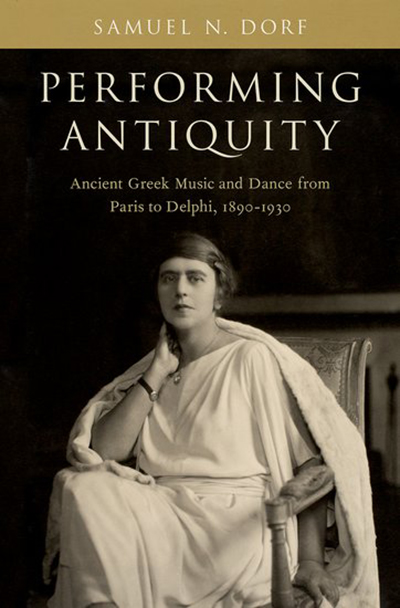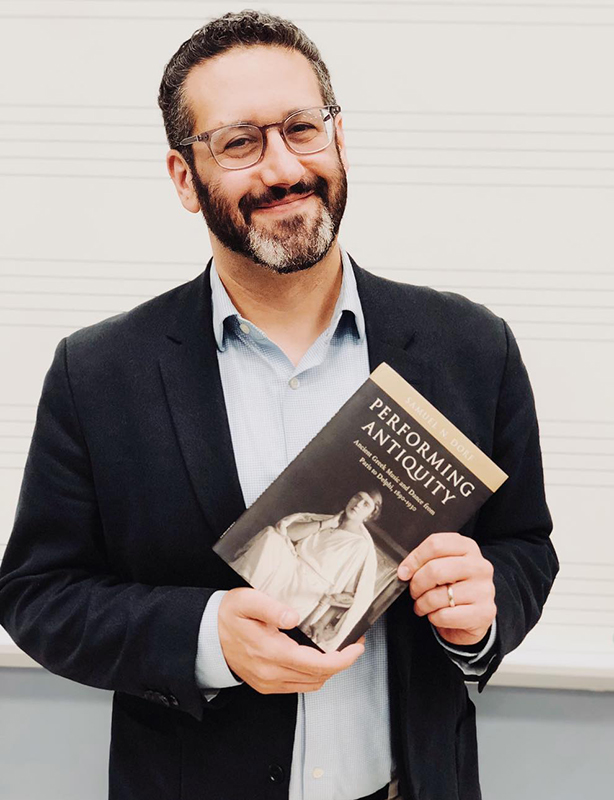College of Arts and Sciences Newsroom

Performing Antiquity
A new book by a University of Dayton musicologist and dance historian spotlights the influence of a pioneering Dayton native on an ancient Greek music and dance revival in Paris during the late 19th and early 20th centuries.
Performing Antiquity: Ancient Greek Music and Dance from Paris to Delphi, 1890-1930 by Samuel N. Dorf explores collaborations between scholars and the performing artists who brought their research to life with reenactments to try to understand what Greek music and dance was like in the distant past.
One of the book’s central figures, Natalie Clifford Barney, was a playwright, poet and novelist who was born in Dayton and lived as an expatriate in Paris. She came out as a lesbian in 1888 at age 12 and hosted salons at her home inspired by the archaic Greek poet Sappho, from the island of Lesbos.
“Natalie Barney created this space where artists, musicians and dancers could mingle with classicists and archaeologists so they could share ideas and collaborate together,” Dorf said. “She was able to foster, nurture and build a community of people who were interested in understanding ancient Greek music and dance, and revivifying, reenacting or reconstructing it for audiences in Paris.”
Dorf, an associate professor of musicology and director of the University’s Early Music Ensemble, will discuss his book and Barney’s role in the movement at 2 p.m. Saturday, March 30, at the Dayton Metro Library, 215 E. Third St. His talk is free and open to the public. Copies of his book will be for sale.
An Ohio historical marker in Cooper Park, adjacent to the library, honors Barney. Installed in October 2009, it was the first in Ohio to note the sexual orientation of its honoree.
Barney was an heiress to the Barney & Smith Car Co. of Dayton, which built railroad cars. Dayton newspapers covered her activities while in Paris, including a play she staged in her back yard that got her evicted from her apartment.
“She had women running around pretty much naked, performing her own versions of the erotic poetry of Sappho,” Dorf said. “It was scandalous and the landlord didn’t want anything to do with it. She was definitely a character, and kind of a role model.”
Dorf’s book grew out of his doctoral degree dissertation, which explored the idea of musical neoclassicism in French musical and dance culture, with people looking back to classical antiquity as source material. His dissertation focused on musicians and dancers, but also touched on a group of archaeologists, classicists, and music and dance historians who were trying to understand what ancient Greek music and dance was really like.
“That was just a small part of the dissertation, and I realized, ‘Wow, that’s a great story, because these people are really crazy,’ and it’s a whole book,” Dorf said.
Published by Oxford University Press, Performing Antiquity is intended not just for musicologists, but also dance historians and people interested in the classics, gender and queer studies, or Dayton history.
Dorf’s archival research took him to Paris, where he visited Barney’s abandoned home and her literary collection at the Sorbonne. He also visited Greece, where he worked with sources in Athens and Delphi, as well as the Smithsonian Institution in Washington D.C., where Barney’s personal papers are archived. Locally, he conducted research at the Dayton Metro Library and the Public Library of Cincinnati and Hamilton County.
In December, Dorf discussed his book at a classics conference in London, followed in February by a neoclassicism conference in Montreal. He also was invited to speak at Northwestern University, where he received his doctoral degree in musicology.
“Dr. Dorf’s scholarship is very interesting for the ways in which he thinks about the relationship between the past and the present,” said Julia Randel, associate professor and Department of Music chair. “He brings that to his music history classes, as well. Students are learning about music of the past and the context in which it was created, but they are also thinking about what it means to perform that music today.”
Dorf said a new generation of scholars and performers are once again trying to recreate ancient Greek music and dance, this time with help from digital tools. But, like their predecessors from a century ago, it’s unlikely that they will truly recapture these ancient art forms.
“We’ll never actually recreate the past — all we’re doing is just creating,” Dorf said. “So, trying to understand their pitfalls and the traps that they fell into is really helpful to us as we develop and reconsider the methods of musicology and dance history today.”
Dorf also holds a master’s of arts degree from Tufts University and a bachelor’s degree from Boston University. He joined the University of Dayton faculty in 2010 and teaches music history for music majors, music and film, and music and gender. He also gives pre-performance lectures for the Dayton Opera.
For more information, please visit his website.
- Dave Larsen, communication coordinator, College of Arts and Sciences


